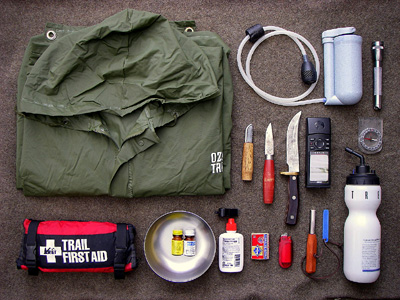What are the most important survival essentials? When you are considering what to bring on a trip or how to prepare for a possible survival situation, it helps to start with the most important gear. Though what you ultimately choose to pack will depend on specific conditions and situations, there are survival essentials that should always be considered.

Survival Essentials:
The Bare Necessities
The four basic needs of nearly all survival situations are shelter, water, fire, and food. The following gear assists with meeting the needs of these four priorities. The order of importance for the following essentials is determined by the the needs of a given situation.
- Shelter – a light-weight tarp, tent, or extra large rain poncho can provide emergency protection from the wind and rain
- Insulating Layers – warm layers of wool or synthetic clothing, rain gear, a warm hat, and gloves assist with regulating your body temperature
- Water Container – having a vessel to transport water is key - metal water bottles can also provide the opportunity to heat water over a fire
- Water Purification System – a good water filtration pump or purification tablets allow you to have clean drinking water
- Fire Starting Tools – carrying at least three different ways to make a fire such as a lighter, waterproof matches and a magnesium flint and steel, in a seal-able plastic bag with dry tinder material, will assist in fire-making
- Food – snack bars or dehydrated food can provide a boost in energy in survival situations
- Knife – a quality, fixed blade knife is a core tool for numerous survival tasks
- Navigation Tools – topographical maps and a compass, signal mirror, and gps unit will help you navigate
- Sun Protection – sunglasses, a wide-brim hat, and sunscreen help protect you from sunburn
- First Aid Kit – one that includes a variety of supplies such as sterile gauze, antiseptic wipes, adhesive tape, bandages in various sizes, tweezers, safety pins, scissors, benadryl, ibuprofen, and any personal medication you may need will allow you to address most first aid situations
- Illumination – a flashlight, preferably a headlamp with extra batteries, can allow you to travel or work on survival tasks into the night
- Miscellaneous Tools – strong rope, a sewing kit, multi-tool, and whistle can assist in many situations
Survival Knowledge
Though these items are great to have prepared and ready to go, the most important survival essentials are your skills and knowledge of how to survive. There are two major ways that survival knowledge is essential: knowing how to effectively use survival gear and having the knowledge to improvise without gear.
Any tools, gear or materials you might have as part of your survival essentials must be used properly in order to serve your needs best. Practice using all of your essentials, and get comfortable with them. Do not leave your gear unopened and unused until a survival situation arises.
Consider this: using a lighter or matches to start a fire in the comfort of your own home is not the same as trying to start one with the same materials while the wind is blowing and the rain is coming down hard. Be sure to practice in all conditions. Similarly, improper use of a water-filtration system can allow contaminants into your drinking water, which could potentially make a survival situation much worse. Understand your gear inside and out.
Again, it is vital that you are familiar with how to utilize all of your essentials and be comfortable using them in a variety of conditions.
What if one or more of your survival essentials are forgotten, become lost or break? What then?
Wilderness Survival Skills
This is where your knowledge of wilderness survival skills becomes essential. If you end up losing your knife, map, compass and fire making tools your challenges may have greatly increased! With some wilderness survival training you could learn how to make a primitive knife, travel using aidless navigation, and make friction fire using wild harvested materials. Then you can manage just fine without the store-bought gear.
Even someone with all the necessary tools for survival can still get into dangerous situations through their lack of knowledge and experience in the outdoors. Practice using all of your essentials under a variety of conditions. Start with the setting most comfortable to you, and practice in increasingly more challenging conditions.
Survival situations demand that you be flexible, adaptable and skilled with utilizing what you have. Resourcefulness is a key to survival, and an attitude of being open to possibilities can be very helpful as well.


No comments:
Post a Comment